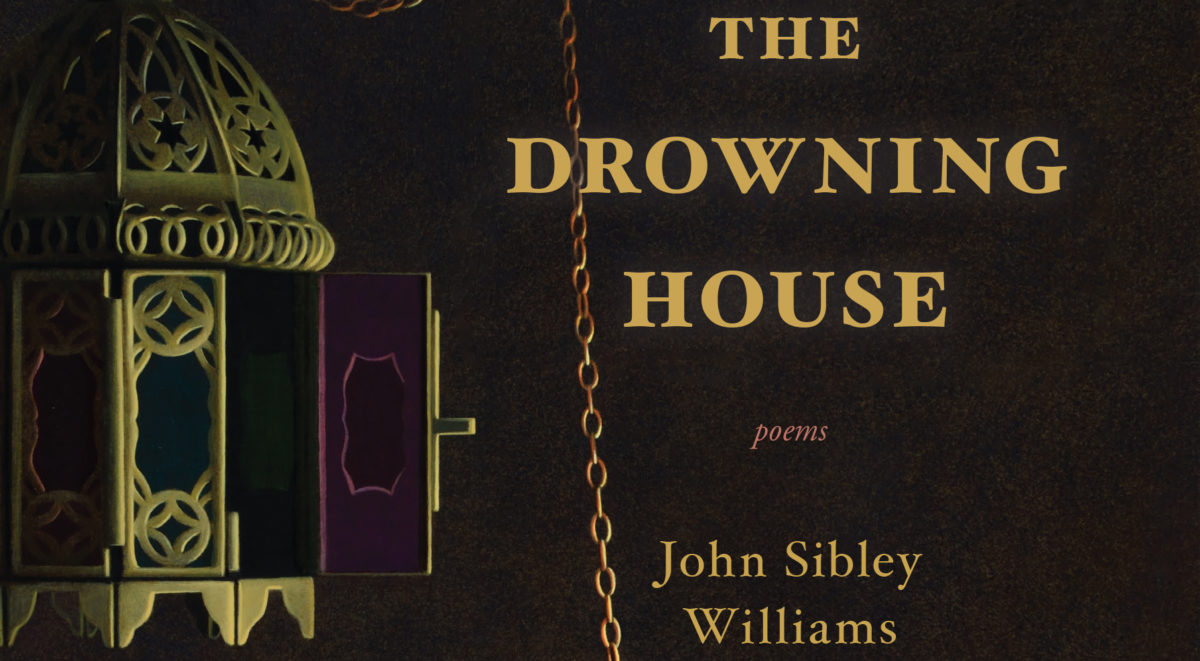
The Drowning House
John Sibley Williams
Elixir Press, 2021
Review by Erica Goss
“I dwell in possibility,” Emily Dickinson wrote—but to survive our daily lives, too often we replace possibility with dullness. Both familiar and comforting, routine implies a necessary amount of distance; repetition blunts our perception of the world around us, allowing us to ignore details that should wake us up, shock us into action, or at the very least cause us to examine our circumstances more closely.
In his latest poetry collection, The Drowning House, John Sibley Williams does just that. As he navigates his day-to-day life, engaging in tasks involving work and family, he sees ordinary things not only for what they truly are, but also for what they were. The tree in “The Dead Just Need to be Seen. Not Forgiven,” for example, signifies a long and violent history: “That tree I used to hang / tires from holds tight its dead centuries. The light / swinging from its branches we call rope-like.”
In “A Poem in Which Everyone Survives Until Dawn,” Williams explores questions of truth, buried history, and what lies at the core of people and things. The poem begins with a series of opposites: the “hard heart” of an avocado, so different from its tender, fully-ripened fruit; a “beautiful roadside bouquet / bound to a guardrail,” reminding drivers that a child died on that spot. A family photograph shows an old man “our family never talks about, / known best for tracking runaway slaves.” Williams highlights the importance of recognizing and acknowledging the truth at the heart of the things around us. Coming near the end of the book, “A Poem in Which Everyone Survives Until Dawn” encapsulates the main ideas in A Drowning House: buried history’s reemergence, and the poet’s growing awareness of that inheritance’s mental, emotional, and cultural costs.
With devastating accuracy, Williams points out in “That is Really Just Rope” the beliefs we count on to get us through our days—beliefs “we fall hard for,” like the “promise of deep green blades / pushing up through concrete.” No matter how comforting, we tell ourselves these stories to survive “grief / that is really just a healed-over / history.” We cannot avoid that history; it exists everywhere, infiltrating our daily lives and environments. Williams shows us how a quick glimpse of something seemingly innocuous forces us to recognize the “healed-over history” surrounding us.
“The animals have / always been terrified of us,” Williams writes in “Incendiary Device.” “They know / something of love we admit only to night.” The poem, a meditation on the fire seasons now agonizingly common in the Western United States, questions our fierce attachment to a place that has become so deadly:
O the thought of this country, all these
homes dancing sparks into a hot & holy
starless sky. There’s a reason we refuse
to leave, even now.
We’ve all seen, especially in recent years, fire’s terrible appetite consume forests and suburbs. In “Incendiary Device,” however, fire is also “a blanket pulled over / the field, up to its eyes, to hide the monsters / imagined in our closet.” Within fire’s destructive force lies erasure, the chance to clear out and start over. When Williams asks, “Is it true this ruin has been ours / the whole time?” he refers to the shifting nature of disaster, and the responsibility inherent in acknowledging it.
Destruction arrives in the form of another element, this time water, in the collection’s title poem, “The Drowning House.” Arranged in fragments that slide over the page, the poem echoes a family’s bewildered response to flooding. It’s unclear where, exactly, the family can go; no place seems safe as the waters rise and they retreat to higher ground. From there the speaker observes:
I can witness
our home, consuming & being consumed. The ironwood
I knifed my name into wash itself clean.
In “The Drowning House,” as in much of this book, things reveal their truest natures as they fall apart. The neighbour’s house disappears, leaving odd remnants; Williams shows how
The plastic deer neck-bent as if chewing up the lawn
go the way of other deer, of the wolves, the arroyo
turned creek again.
Alert to social consciousness while remaining intensely private, these poems disturb; reading them, however, we sense the motivation beyond a straightforward need to inform. A Drowning House calls us to wake up from our self-induced stupor and contend with the consequences of the past. Don’t ignore this, Williams tells us. Break through the dullness. Look closer.
Erica Goss’ poems, essays and reviews appear widely. She is the editor of Sticks & Stones, a literary newsletter featuring poetry book reviews. Her collection, Night Court, won the 2017 Lyrebird Award from Glass Lyre Press. Recent and upcoming publications include Creative Nonfiction, North Dakota Quarterly, Spillway, A-Minor, Redactions, Consequence, The Sunlight Press, The Pedestal, San Pedro River Review, and Critical Read. Erica served as Poet Laureate of Los Gatos, California, from 2013-2016. She lives in Oregon’s South Willamette Valley.